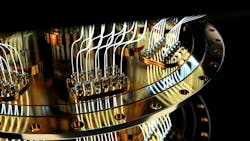Fiber Optics Bring Benefits to Quantum Computing
Per a Techspot article, researchers in Austria have developed a breakthrough in quantum computing. Quantum computers need to be kept at temperatures slightly above absolute zero, and to maintain these temperatures multi-million dollar systems called dilution refrigerators are utilized. However, with this latest discovery, the cost of these computers could decrease drastically, by eliminating one of the primary heat sources, wires.
The electrical signals in quantum computers travel through wires, which in turn build up heat from the resistance. Since there are millions of signals reaching the qubits, the basic units that operate within these computers that can calculate particular problems at breakneck speeds, the heat generated escalates quickly. This leads to a need for larger and more expensive cooling setups for the computers.
At the Institute of Science and Technology Austria (ISTA), researchers “replaced these electrical connections with fiber optic cables, which can transmit signals using light instead of electricity. Fiber optics are effectively heat-free and have other advantages, such as higher bandwidth and less electromagnetic interference.”
The article points out an issue though, qubits can not directly process optical signals. Though the team had a solution for this by utilizing an electro-optical transducer to convert the optical signals into microwaves (which the qubits understand) and the reverse.
“Georg Arnold, co-lead author of the study published in Nature Physics, said that the new approach might allow them to increase the number of usable qubits so they become useful for real computation. He also stated that it sets the stage for networking multiple quantum computers over fiber optic links at room temperature. The technology removes a lot of performance-limiting electronics, too.”
While this is an amazing breakthrough, this is a prototype that still requires time to be improved. However, it does provide a possible solution for heating within quantum systems and reduces the need for each component to be super-cooled. This could make quantum computers not only more cost-efficient to build but also more practical and could lead to them having massive operations abilities.
